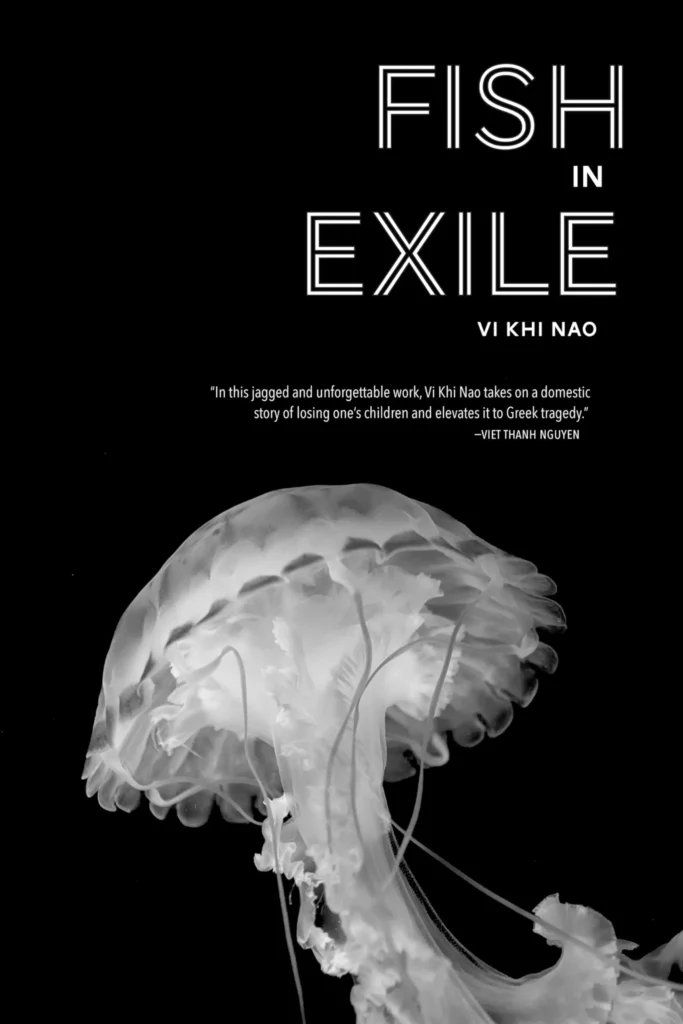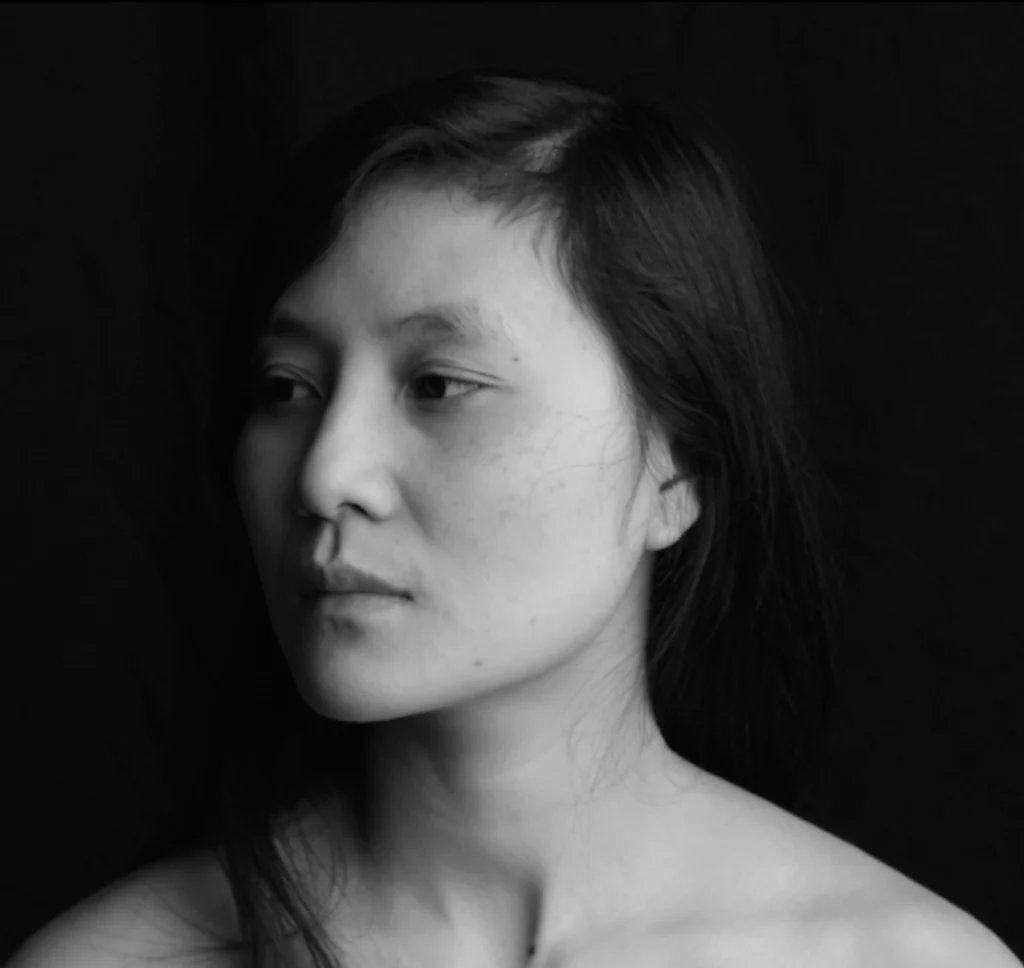
An Interview with Vi Khi Nao
Words By Vi Khi Nao, Interview by Erxi Lu, Art By Stephane Hurbe
How did you stumble into writing? Into Fish in Exile’s writing style or another writing style that you loved embodying? What was the revision/editing process like, did you have to negotiate with the editor?
I started as a visual artist before transitioning to writing, which eventually became my focus. My journey into the literary world began with Vanishing Point of Desire. Later, as a graduate student at Brown University, I wrote Fish in Exile over the course of three years. During that time, I was in a domestically abusive relationship and needed to create a coded language to express my pain without my partner, who often read my work, understanding its meaning. The experimental and cryptic nature of Fish in Exile became a way to process that pain.
My partner was highly intelligent and perceptive, qualities I also attribute to many readers. I wrote the book in sections, often in a single breath, but the gaps between sections required lived experiences to inform the writing. It wasn’t simply a matter of drafting—it was about gathering the emotional and empirical depth necessary to give the manuscript life. While the work is deeply rooted in realism, a manuscript can’t open itself into a vector of empirical data without support, even if it is real or experimental.

How do you propose a writer get this life experience?
I wouldn’t recommend pursuing a dangerous life. Experiences, in my opinion, can be overrated. They aren’t something to chase—they should come to you naturally, like an Amazon package you’ve ordered. With deep reflection, you don’t always need to endure hardship or gather empirical evidence to gain insight. Through practices like intensive meditation or processing emotions privately, without external societal input, experiences can become secondary. Instead, the essence of your existence can emerge from introspection.
This approach seems to echo what Emily Dickinson and other successful writers did. Many introverted writers delve into the layers of their consciousness to explore experiences internally, rather than relying on external, material ones. Today, we live in a world that’s highly focused on optics and outward appearances, but it wasn’t always this way. Sometimes, the act of seeing is itself an experience—one that differs from the experiences of movement or emotion driven by the legs or the heart.
Feel free to disagree, but I heard writers always loop back to write about the same topics over and over again. Different iterations, perhaps, and with different nuances, but the core of the person sometimes stays the same. Would you say this happens for your writing? What ideas or themes do you find yourself returning to?
In poetry, repetition shapes the rhythm and structure of the piece. Similarly, when fiction writers—or writers in general—grapple with unresolved subconscious issues, they may rewrite the same story from different angles to uncover a new perspective on an experience or event. This process mirrors a human tendency to seek out specific textures or emotions, repeatedly re-entering a space of trauma, tragedy, joy, or pain. It’s akin to listening to the same song on repeat, not merely to explore its narrative but to relive the texture of the experience.
This repetition can also resemble savoring a favorite dish—enjoying it again and again until the palate is dulled, until the experience reaches a point of saturation, allowing the individual to finally let go. In storytelling, this cyclic repetition becomes a mechanism for coping with trauma, indulging textural preferences, and pursuing transformation.
When transformation occurs, the writer—or individual—moves forward, leaving the repetitive cycle behind to begin anew. This shift creates space for forgiveness and renewal, where the past no longer dictates the narrative. A writer capable of crafting diverse stories demonstrates a profound ability to forgive, release the past, and embrace fresh narratives, reflecting personal growth and resilience.

What is your philosophy for teaching creative writing? And, what advice would you offer to aspiring writers looking to get into the publishing industry?
I think the process is fluid—there’s no definitive right or wrong way to approach it. That said, there are plenty of ways to go astray. When it comes to teaching, I have mixed feelings. I deeply care about my students and their futures, but I hesitate to encourage them to pursue writing as a vocation. It’s an incredibly difficult path, one of the hardest lives to lead.
If a student has a talent or background in something else, like math or finance, I’d advise them to pursue that first and create space for writing as a passion—like a mistress you visit in secret, rather than making it your primary partner. There’s nothing inherently wrong with pursuing writing full-time, but there’s a reason a mistress is called a mistress: it thrives in its own space.
I believe writing should be pursued quietly, not as a primary career. While there are successful writers, I’m speaking about the vast majority of people, not the rare authors who achieve fame and wealth. For most writers in the literary world, survival itself is expensive. Competition is fierce; when I apply for teaching positions, there are often 200 applicants for a single opening. The odds aren’t just unfavorable—they’re daunting.
This challenge extends beyond jobs to publishing. If your livelihood depends on writing, you’re at the mercy of others accepting your work, which can take years—even decades. That dependence can lead to desperation, and desperation isn’t conducive to creativity.
There’s no shame in pursuing writing if you’re financially secure, married to someone with resources, or otherwise supported. But for working-class individuals who need to put food on the table, it’s a far more precarious choice. I don’t believe suffering is necessary to create art. Struggling to survive—sacrificing your health, skipping meals, living with constant anxiety—only drains the energy that could be directed toward creativity. Having stability and meeting basic needs allows your mind to focus on art, rather than survival.